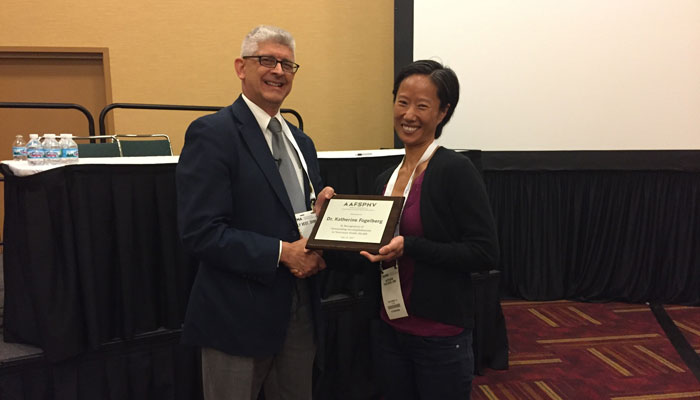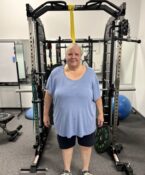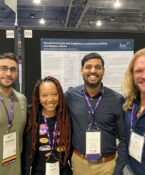Professor named Public Health Veterinarian of the Year

For years, UNT Health Science Center’s Katherine Fogelberg, DVM, PhD, has donated her spare time to treating animals and finding homes for rescued pets.
An Assistant Professor in the School of Public Health, Dr. Fogelberg has worked with zoo and wildlife animals as far away as South Africa, and has helped connect veterinarians with public health emergency preparedness efforts in the United States.
She developed an international partnership for public health students that ties veterinary aid services to human/animal public health and disease prevention.
In recognition of her contributions to the field, Dr. Fogelberg was named the 2017 Public Health Veterinarian of the Year by the American Association of Food Safety and Public Health Veterinarians (AAFSPHV).
Trained as a vet with a special interest in zoo medicine, Dr. Fogelberg began exploring the connection of animals to the health of people during her doctoral studies. That ultimately led her to work with Professor David Sterling, PhD, to develop a class on this topic for the School of Public Health.
Since then, she has designed and now directs a graduate certificate program in Food Security and Public Health for UNTHSC that studies the food chain implications of animal health on people, and she is helping SPH students see public health in different ways.
“One of Dr. Fogelberg’s achievements since joining UNTHSC has been to connect our public health students with the international organization Veterinarians Without Borders. She led the first group of students to Uganda last year, establishing a link between veterinary aid efforts and protections on the health of people,” said Dennis Thombs, PhD, Dean of the School of Public Health.
“There are many illnesses and diseases that can be passed from animals to people. So far, our student volunteer teams have been able to assist with TB testing and prevention efforts,” he said.
Also important is Dr. Fogelberg’s work with the Society for Disaster Medicine and Public Health to establish collaborations between emergency first responders, public health professionals and veterinarians.
“Disaster situations like those we saw with hurricanes Katrina and Ike impact animals as much as people,” she said. “Roughly 30 percent of people in a disaster will refuse to evacuate without their pets. Shelters may not be able to accept animals, and it’s devastating for individuals and families who become separated from their pets. In areas where livestock means livelihood, a disaster could also affect the ability of farms and related businesses to make a living and deliver products.”
As Director of Quality Instruction and Assistant Professor of Biostatistics and Epidemiology, Dr. Fogelberg draws on the different aspects of animal/public health to share a broad perspective with students and inspire their passions the way she found hers.





Social media